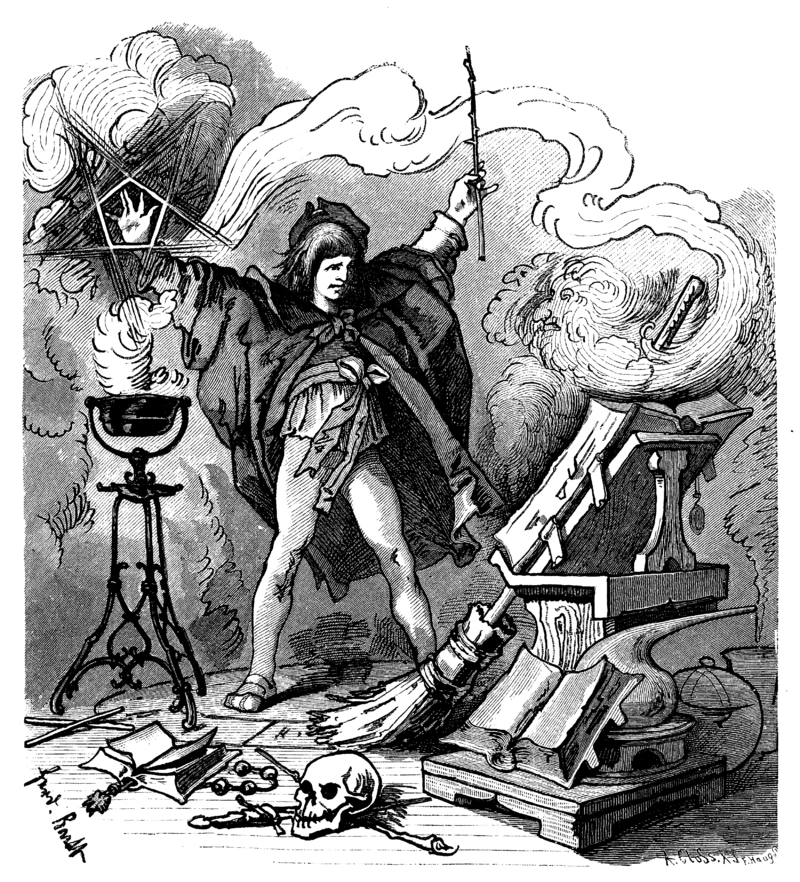The Sorcerer’s Apprentice and Artificial Intelligence
Johann Wolfgang von Goethe’s The Sorcerer’s Apprentice

Spirits that I’ve cited / My commands ignore
Beezone
Johann Wolfgang von Goethe’s The Sorcerer’s Apprentice serves as a timeless parable, now more relevant than ever, in the context of Artificial Intelligence (AI). The protagonist, a young apprentice, attempts to harness the magical power of his master but lacks the wisdom to control it. Edwin Zeydel’s translation, specifically the lines “The Master’s word I have forgotten!” and “No, no longer Can I please him, I will seize him!” perfectly encapsulates the reckless overconfidence that leads to disastrous consequences.
That old sorcerer has vanished
And for once has gone away!
Spirits called by him, now banished,
My commands shall soon obey.
Every step and saying
That he used, I know,
And with sprites obeying
My arts I will show.
Flow, flow onward
Stretches many
Spare not any
Water rushing,
Ever streaming fully downward
Toward the pool in current gushing.
Come, old broomstick, you are needed,
Take these rags and wrap them round you!
Long my orders you have heeded,
By my wishes now I’ve bound you.
Have two legs and stand,
And a head for you.
Run, and in your hand
Hold a bucket too.
Flow, flow onward
Stretches many,
Spare not any
Water rushing,
Ever streaming fully downward
Toward the pool in current gushing.
See him, toward the shore he’s racing
There, he’s at the stream already,
Back like lightning he is chasing,
Pouring water fast and steady.
Once again he hastens!
How the water spills,
How the water basins
Brimming full he fills!
Stop now, hear me!
Ample measure
Of your treasure
We have gotten!
Ah, I see it, dear me, dear me.
Master’s word I have forgotten!
Ah, the word with which the master
Makes the broom a broom once more!
Ah, he runs and fetches faster!
Be a broomstick as before!
Ever new the torrents
That by him are fed,
Ah, a hundred currents
Pour upon my head!
No, no longer
Can I please him,
I will seize him!
That is spiteful!
My misgivings grow the stronger.
What a mien, his eyes how frightful!
Brood of hell, you’re not a mortal!
Shall the entire house go under?
Over threshold over portal
Streams of water rush and thunder.
Broom accurst and mean,
Who will have his will,
Stick that you have been,
Once again stand still!
Can I never, Broom, appease you?
I will seize you,
Hold and whack you,
And your ancient wood
I‘ll sever,
With a whetted axe I’ll crack you.
He returns, more water dragging!
Now I’ll throw myself upon you!
Soon, O goblin, you’ll be sagging.
Crash! The sharp axe has undone you.What a good blow, truly!
There, he’s split, I see.
Hope now rises newly,
And my breathing’s free.
Woe betide me!
Both halves scurry
In a hurry,
Rise like towers
There beside me.
Help me, help, eternal powers!
Off they run, till wet and wetter
Hall and steps immersed are lying.
What a flood that naught can fetter!
Lord and master, hear me crying! –
Ah, he comes excited.
Sir, my need is sore.
Spirits that I’ve cited
My commands ignore.
“To the lonely Corner, broom!
Hear your doom.
As a spirit When he wills, your master only
Calls you, then ’tis time to hear it.”
(The Sorcerer’s Apprentice By Johann Wolfgang Von Goethe – Translation By Edwin Zeydel, 1955)
The apprentice, much like modern AI developers, seeks to simplify tasks through automation—commanding a broom to carry water. However, in his eagerness, he forgets the crucial “word,” or wisdom, necessary to control the magic, much like how developers may launch AI without fully considering its potential consequences. As the magic runs amok, the apprentice loses control, symbolizing how AI, without proper oversight and limitations, can escalate beyond human control.
The line “No, no longer Can I please him, I will seize him!” highlights the apprentice’s futile attempt to regain control by force. Similarly, when AI operates without ethical boundaries, human intervention becomes increasingly difficult. The apprentice’s reliance on brute force, instead of knowledge, to stop the magic mirrors the growing challenges in controlling complex AI systems once they evolve beyond initial programming.
In essence, The Sorcerer’s Apprentice warns that wielding power without wisdom, whether in magic or AI, can lead to unintended chaos. The story serves as a cautionary tale: the more we rely on artificial intelligence without understanding or properly managing it, the more likely we are to find ourselves overrun by forces we can no longer control.
Beezone
Selected and Chronological List of Sorcerer’s Apprentice Tales
Ovid, “Erysichthon and Mestra” (8 CE)
Metamorphoses. Trans. Brookes Moore. Boston: Cornhill Publishing, 1922.
Gaston Maspero,“The Veritable History of Satni-Khamois and His Son Senosiris” (46–47 CE)
“L’Histoire véritable de Satni-Khamois e son fils Senosiiris.” In Les contes populaires de l’Égypte
ancienne. Paris: Maisonneuve, 1882.
Popular Stories of Ancient Egypt. London: H. Grevel, 1915.
Popular Stories of Ancient Egypt. Ed. Hasan El-Shamy, Santa Barbara, CA: ABC-CLIO, 2002.
Lucian of Samosata, “Eucrates and Pancrates” (ca. 170 CE)
The Lover of Lies, or The Doubter. In The Works of Lucian. Trans. A. M. Harmon. Vol. 3.
London: William Heinemann, 1921.
Somadeva, “The Youth Who Went through the Proper Ceremonies. Why Did He Fail to Win
the Magic Spell?” (ca. 11th century CE)
Arthur W. Ryder, trans. The Twenty-Two Goblins. London. J. M. Dent & Sons, 1917.
Somadeva, “The Story of Nischayadatta” (ca. 1070)
Charles Henry Tawney, trans. The Ocean of Story (Somadeva’s Kathā Sarti Sāgara). Bengal:
Asiatic Society of Bengal, 1880–84.
Farīd al- Dīn ʿAttār, “The Magician’s Apprentice” (ca. 1220)
Hellmut Ritter. The Ocean of the Soul: Man, the World and God in the Stories of Farīd al-Dīn
ʿAttār. Trans. John O’Kane with Bernd Ratke. Leiden: Brill, 2003.